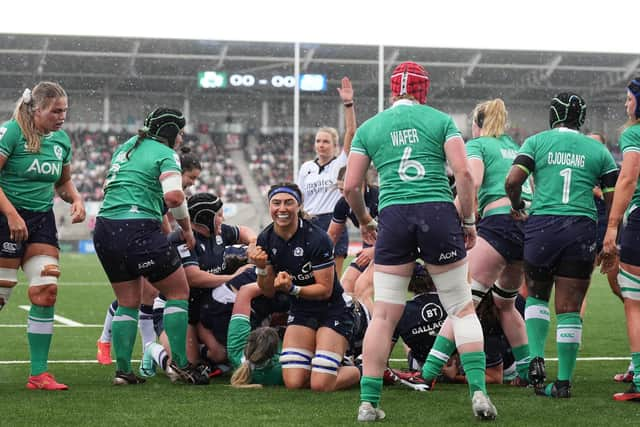Scotland edged out by Ireland in Six Nations finale with concern over Caity Mattinson injury
Scotland’s Six Nations campaign ended in disappointment in Belfast as Ireland did just enough to win 15-12 and leapfrog their opponents into third place in the final table.
Automatic qualification for next year’s Rugby World Cup - and a place in the WXV1 tournament at the end of this year - goes with that third place. So Scotland were left doubly frustrated by the defeat given how much was riding on the result.
Advertisement
Hide AdAdvertisement
Hide AdThe winning of that World Cup place will surely be deferred rather than denied, given the number of qualifying slots on offer in WXV2 - the second tier of the global competition in which Scotland will compete. But it was nonetheless a frustrating afternoon at the Kingspan Stadium for the team, as their captain, Rachel Malcolm, admitted.
“There were opportunities to win the game and we didn’t take them,” she said. “I think we struggled to break them down from an attack point of view. Our lineout defence gave us a platform to play off: our lineout attack probably didn’t function as well as we would have liked.
“When we had the ball we probably didn’t threaten as much as we would like. Right now I don’t know exactly why that is.
“Defensively we put in a brilliant performance, particularly in the first 40 minutes when Ireland were really going at us in terms of those physical carries - I think we fronted up phenomenally well. But we can’t defend for that length of time and not potentially break. It’s what happened.”
Having said all that, Malcolm insisted that the team remain on an upward trajectory after a campaign that saw them win in Cardiff for the first time in 20 years and in Italy for the first time since 1999. “To have two wins, to come so close against France and push Ireland right up to the final whistle, is an incredible achievement in a very tough tournament,” she continued.


“That doesn’t mean that we’re satisfied with that, but it doesn’t change what we’ve built over the last 12 months. The conviction in attack and the ability to put away opportunities is going to be the difference to take us to the next level.”
Scotland scored the only points of a hard-fought first half when hooker Elis Martin scored an unconverted try from a driven maul. Scrum-half Caity Mattinson then needed lengthy on-field treatment before being stretchered off; there was no immediate word on her condition from the Scotland camp.
After getting no reward for their labours in the first half, Ireland drew level minutes into the second through winger Katie Corrigan. Scotland hit back through a Lisa Thomson try, converted by Helen Nelson, yet, while they had fallen 12-5 behind, Ireland had begun to put in a series of dominant tackles in defence and were looking increasingly dangerous in open play.
Advertisement
Hide AdAdvertisement
Hide AdThey drew level when O’Brien converted a Cliodhna Moloney try from a driven maul, and then O’Brien knocked over what turned out to be the winning penalty with a few minutes left. Scotland had two late chances to go for goal but sent the ball to touch instead and failed to capitalise from the lineouts.
“It’s probably one that I’ll need to have a look back at,” Malcolm admitted of that late passage of play. “It was the decision we made in the moment and we back that.”
Comments
Want to join the conversation? Please or to comment on this article.